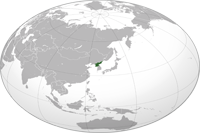North Korea
|
|

Basic Info
The Democratic People's Republic of Korea, commonly called North Korea, is a country in East Asia, in the northern half of the Korean Peninsula. Its capital is Pyongyang, the country's largest city by both land area and population. The Amnok River and the Tumen River form the international border between North Korea and the People's Republic of China. A small section of the Tumen River also lies along the border between North Korea and the Russian Federation, technically following the river's thalweg. The Korean Demilitarized Zone is the boundary between North Korea and South Korea.

Geography
North Korea occupies the northern portion of the Korean Peninsula, lying between latitudes 37° and 43°N, and longitudes 124° and 131°E. It covers an area of 120,540 square kilometres (46,541 sq mi). North Korea shares land borders with China and Russia to the north, and borders South Korea along the Korean Demilitarized Zone. To its west are the Yellow Sea and Korea Bay, and to its east lies Japan across the Sea of Japan (East Sea of Korea). The highest point in North Korea is Baekdu Mountain at 2,744 metres (9,003 ft). The longest river is the Amnok River which flows for 790 kilometres (491 mi). The capital and largest city is Pyongyang; other major cities include Kaesong in the south, Sinuiju in the northwest, Wonsan and Hamhung in the east and Chongjin in the northeast.
Climate
North Korea has a continental climate with four distinct seasons. Long winters bring bitter cold and clear weather interspersed with snow storms as a result of northern and northwestern winds that blow from Siberia. Average snowfall is 37 days during the winter. The weather is likely to be particularly harsh in the northern, mountainous regions.
Religion
Both Koreas share a Buddhist and Confucian heritage and a recent history of Christian and Cheondoism ("religion of the Heavenly Way") movements. The North Korean constitution states that freedom of religion is permitted. According to the Western standards of religion, the majority of the North Korean population could be characterized as irreligious. However, the cultural influence of such traditional religions as Buddhism and Confucianism still have an effect on North Korean spiritual life.
Administrative divisions
The nine provinces derive from the traditional provinces of Korea, but have been further subdivided since the division of Korea. They are large areas including cities, rural and mountainous regions. The two directly governed cities (Chikhalsi; 직할시, 直轄市) are large metropolitan cities that have been separated from their former provinces to become first-level units. Four other cities have been directly governed in the past, but were subsequently reunited with their provinces or otherwise reorganized.
The three special administrative regions were all created in 2002 for the development of collaborative ventures with South Korea and other countries. One of them, the Sinuiju Special Administrative Region, was intended to draw Chinese investment and enterprise, but as of 2006 appears never to have been implemented. The special administrative regions do not have any known second- and third-level subdivisions.
Site Search
News
Random Articals
Weather
Join Our Newsletter
Send This Page to Friend
To Email this page to a friend
1. Use Your Default Email Client
2. Use Our Recommend Page
Online Contact
nouahsark
1438084734
+ 86 158 00 323 707
+ 86 158 00 323 707
nouahsark@hotmail.com


If you like this article please feel free to share it to your favorite site listed below: